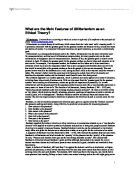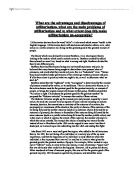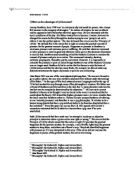What are the Main Features of Utilitarianism as an Ethical Theory?
What are the Main Features of Utilitarianism as an Ethical Theory?
Utilitarianism: 'A moral theory according to which an action is right only if it conforms to the principle of utility' (www.utilitarianism.com)
Utilitarianism is a moral theory of usefulness, which comes from the Latin word 'utilis' meaning useful. It is primarily concerned with the greatest good for the greatest number and because of this, reflects the wants and desires of society. It is concerned with good outcomes not good intentions, as no action is intrinsically good.
Utilitarianism is a consequentialist theory and in the 1960's, utilitarianism was the term commonly used for consequentialism, and that use of utilitarianism remains today, but many people now use the term utilitarianism to designate a kind of consequentialism. Because of this, the greatest good is relative to the situation in hand. To obtain the greatest good for the greatest number one has to judge each situation on its own merits. For example, if an expectant mother, her husband and her father are in a car crash then a utilitarian would try to save the expectant mother first as she is pregnant and therefore there are two lives that would be saved (this is the greatest number as far as the people in the car are concerned). The next person to save would be the husband as he is still young and has a child on the way and lastly the woman's father. The woman's father would be saved last of all because he as had most of his life already and therefore the expectant mother and her husband would benefit more from being saved.
The utilitarian approach is a flexible approach, which is pratical and easily applied to all sorts of situations, including those where moral dilemmas exist. With no rules apart from the 'greatest good for the greatest number' and according to utilitarianism, actions are guided on experience (a posterioi). On its own utilitarianism and the greatest good for the greatest number may not seem like a very desirable option but in many cases is a lesser of two evils. The founder of utilitarianism, Jeremy Bentham (1748 - 1832) said, "Nature has placed mankind under two sovereign masters, pleasure and pain". He went on to define utility as "any object, which produces benefit, advantage, pleasure, goodness or happiness or tends to counter act mischief, pain, evil or unhappiness". Bentham wanted to remove selfishness wants and desires from society. His aim was to get society to maximise its pleasure and minimise its pain is a social sense for ever action.
Bentham, in a bid to maximise pleasure and minimise pain, gave us a guide called the "hedonic calculus" (the pleasure seeking calculator). Along with this, he produced seven points for measuring pleasure:
. How intense is the pleasure?
2. How durable is the pleasure?
3. How certain is the pleasure?
4. What is the extend of the pleasure?
5. How rich is the pleasure?
6. How pure is the pleasure?
7. How remote is the pain?
Bentham regarded the hedonic calculus or utility calculus as it is sometimes referred to, as a "cost benefits formula" to be applied to relative quantities of pleasure and pain but in doing this, people accused Bentham of giving in to people's wants and desires. Bentham's hedonic calculus can be understood in two distinct ways, either as a guide for decision as to what action to take, or as a guide for the evaluation of an action.
A supporter of Bentham was John Stuart Mill (1806 - 1873). Mill realised the problem that had come from Bentham's utilitarianism and tried to make the 'quantity' of the pleasure into the 'quality' of the pleasure. He said, "Pleasure and freedom from pain are the only things desirable as ends". Mill claimed that Bentham's critics had missed Bentham's point and that although desires had to be catered for, not all desires were base desires and intellectual pursuits were intrinsically good, desirable and worthwhile than base desires.
Again, in defence of Bentham, Mill said that if we ...
This is a preview of the whole essay
A supporter of Bentham was John Stuart Mill (1806 - 1873). Mill realised the problem that had come from Bentham's utilitarianism and tried to make the 'quantity' of the pleasure into the 'quality' of the pleasure. He said, "Pleasure and freedom from pain are the only things desirable as ends". Mill claimed that Bentham's critics had missed Bentham's point and that although desires had to be catered for, not all desires were base desires and intellectual pursuits were intrinsically good, desirable and worthwhile than base desires.
Again, in defence of Bentham, Mill said that if we applied the hedonic calculus to intellectual, or higher pursuits and pleasures, it would reveal that they would be (and are) more intense than base desires as well as being more rich, pure and durable. For example, Mill would say that in the long run, you would derive more pleasure from reading Tolstoy or Jane Austin over several evenings and on the odd night going out to the pub rather than spending all your evenings down the local pub and chasing members of the opposite sex. Mill claimed that instinctively we would know that intellectual pursuits are better than bas desires. "Few human beings would consent to be changed into any of the 'lower animals' for a promise of the fullest allowance of a beast's pleasures." Along with this, Mill is saying that we have a natural thirst for knowledge and that we know it is desirable not just a means to an end.
To back this up, Mill said, "It is better to be a human being dissatisfied that a pig satisfied; better to be Socrates dissatisfied than a fool and satisfied" (I.e., ignorance is not bliss and that we would rather intellectually higher with pain than have base desires).
Utilitarianism is, in some respects a very good theory to use in modern day as in broadly fits in with common sense towards morality. Ordinarily, most of us feel that morality should have something to do with maximising pleasure and that is what utilitarianism is all about - the greatest god for the greatest number and to justify many of your actions, we tend to use the phrase "the greater good".
Utilitarianism tends to compliment a secular society as many of us have wants and desires. Utilitarianism caters for the fact that our well-being relates to satisfaction of wants and desires and agrees that it is aright to be hedonistic but we should avoid blatant selfishness. It realises that there is not such thing as duty and/or obligation (This is because modern society find that the idea of duty infringes upon personal freedom which is a basic human right). Along with this is the idea that with rule based approaches; there is always a possibility of breaking a rule where as utilitarianism avoids this problem. For example, the rule 'never tell lies' and the rule 'protect life' clearly conflict so if a mass murderer was to ask where the hiding place of his next victim was the utilitarian would simple lie to him where as people who might follow a rule based approach will be forced to break one of these rules. The person who follows rules can find no justification in doing so other than a utilitarian one. This then poses the question why not be a utilitarian in the beginning.
Utilitarianism is quite a practical thing to use. Whether we know it or not, in reality we do actually make our decisions based on how much good they will bring. In a sense, we use a version of the hedonic calculus (albeit a less detailed version).
Examine and Consider Criticisms which have been made Against Utilitarianism (10)
The criticisms that have been made against utilitarianism are many especially with regards to the hedonic calculus.
The hedonic calculus and its cost benefits formula are often asked if they are accurate in terms of predicting outcomes. Many have said the answer to this is no. If we take the case of the car crash with the expectant mother, her husband and her father, who would we chose first? Clearly in any normal circumstance the expectant mother but say later on we find out that the mother's father has just invented a cure for aids (which as it happens the expectant mother suffers from). Then who do we chose to save first? The point is that no outcome is for certain and that a lack of information can prevent us from producing the greatest good for the greatest number. The application of Bentham's hedonic calculus makes us appear cold, clinical and robotic in our decision making and therefore ignoring raw sentiment and emotion.
Utilitarianism bases itself in predictability and because we cannot see into the future, we are unable to actually realise what the greatest good for the greatest number actually at the time or will be. This may lead to a greater amount of pain being caused with no intention of doing so. With utilitarianism, there is no way of justifying your actions.
As one of the main supporters of utilitarianism and Bentham, Mill has come under a lot of criticism, as has utilitarianism its self. Of Mill, the question being asked is 'are intellectual pursuits genuinely worthwhile in themselves'. It is probable that intellectual pursuits are can be justified on utilitarian grounds and in the end will most likely bring happiness to others but what if the person who is learning themselves remains unhappy and dissatisfied? Should the person who is unhappy sacrifice their own happiness for that of others? Although Mill would say yes to this comment, few would agree with him and therefore, Mill is not taking egoism or selfishness seriously.
Another problem with Mill's argument is that his ideas of intellectual pursuits being intrinsically desirable reflects and ideal. This is and 'a priori' assumption and as such, is independent of experience and because of this, experience may suggest that it is not worthwhile having intellectual pursuits if they offer no immediate or long-term gain. The problem with having an ideal is that is that it is almost a substitute for the failure of experience and the critic would claim that the grounds for such and ideal are arbitrary.
At the heart of Mill's utilitarianism, there is a paradox. As a utilitarian, he should, to be consistent, justify all his claims about the superiority of intellectual pursuits based on experience i.e., 'a posteriori'. It is claimed that only experience can show us the greatest good for the greatest number. Utilitarianism denies that ideals exist but in this, Mill is proclaiming one. It argues that it is fine to be hedonistic but we should avoid selfishness and it recognises that there is no such thing as duty or obligation. Modern society finds the notion of duty to contravene upon personal freedom.
Utilitarianism avoids one of the key problems associated with rule based approaches to morality which is when two moral laws conflict. For example, the rule 'never tell lies' conflicts with the rule 'protect life to the best of your ability'. (E.g. if we were asked by a mass murderer the whereabouts of his next victim, the utilitarian would lie to the murderer) For the person who believes in rules, they are forced to break one of these rules either way. The only grounds for doing this are on utilitarian grounds (In other words, why not be a utilitarian in the first place).
On the practicality of utilitarianism, either consciously or unconsciously, we make our decisions on how much good we are going to achieve in a situation. In this sense, we assume a version of the hedonic calculus.
The problems with utilitarianism in general are that it relies on prediction. Utilitarianism is primarily concerned with producing the greatest good for the greatest number but as we do not know what the future is there is always the possible that our actions will produce circumstances that we do not like and will cause a greater deal of pain than good.
As a utilitarian, if your actions have dire consequences then you will, and would not, have nothing to fall back on and no absolute way of vindicating your actions. In a contrast, someone who upholds moral ideals can justify their actions even if their actions are painful as they have their rules. The point here is that intentions can be controlled where as actions cannot and people who uphold rules can claim that they had good intentions where as the utilitarian cannot. Utilitarianism is able to sanction actions which ordinarily we would no and find disgusting and this is again because it has no rules and says that the ends do justify the means. An example of this is the Nazi killing innocent Jews, Poles and other such people during World War 2.
A problem arises with utilitarianism if we discover that two courses of action are likely to produce the same amount of goodness which then poses the problem of which do action do we chose? If one of the ways of was inherently moral, we may choose this one but in doing so, in theory, abandoning the utilitarianism criteria and in doing so are also using other ways of deciding.
The next question that we have to ask ourselves is, 'Is happiness quantifiable'. Is it sensible to believe that actions can be changed into a mathematical formula that measures their respective goodness and is it realistic to suppose that all peoples pleasure is the same? The thing that should be noted here is that we all experience pleasure differently and through different ways and means and it is individual and subjective. The problem with this is that any action can be justified on utilitarianism grounds, which is not always a good thing.
In a utilitarian world, the minority do not exist as utilitarianism is based on the greatest good for the greatest number. This means the majority. I therefore means that the minority are left to suffer the pain of being a minority as well as any pain left from the greatest good for the greatest number. An example of this may be people who disagree with Sunday trading. These people have to suffer the fact that the majority want Sunday trading and the pain that people who drink on a Sunday may get loud and abusive which may cause them pain.
Although utilitarianism preaches the greatest good for the greatest number, it does not state that the 'good' that comes from it should be dispersed on an equal basis. A classic example of this is global wealth and although we know that there are many people who are starving, a utilitarian may come to a decision that it causes more pain to the 'well-off' to share the resources equally amongst the world. From this we have to assume that a utilitarian would be prepared to let a minority starve.
Utilitarianism assumes that we would approach each situation in a robotic way and that we calculate the goodness that may come from each situation mechanically. The reality is far from the cold, robotic form that utilitarianism assumes. In actual everyday life, we allow emotion to take over especially if a decision is a matter of 'life-or-death'. As humans, we are emotional and in no way robotic. This is shown by the fact that we act out of self-interest, which can work against utilitarianism.
In conclusion, I feel that utilitarianism is a very cold and harsh approach to life. It disregards raw emotion, which is part of the human make-up. It implies that our own feelings should be disregarded and that the hedonic calculus should be used to 'total up the goodness that will come from our actions'. I feel that although sometimes we may use utilitarian approaches, it does not make it right to act as cold and hardened to the world as it does appear to.







